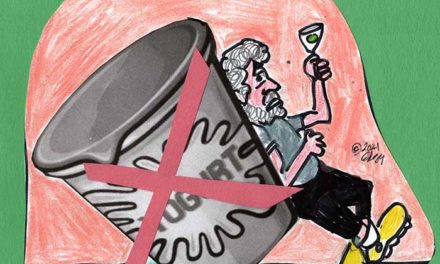For Some of Us, Memorial Day is a Day of Atonement
Reflections on a life altered by six numbers
By Ed Goldman
Memorial Day has always been a day of atonement for me since only six numbers prevented my being called up to serve in the U.S. Army in 1969.
It was during the height of the Vietnam War and the reboot of the Selective Service System’s draft lottery for the first time since 1942. Men born from January 1, 1944 through December 31, 1950, were eligible. I was born on November 15, 1950. If I’d been able to hang around in utero for another 17 days, I’d have been home free.
As the process was explained in the occasionally accurate Wikipedia, “The 366 days of the year (including February 29) were printed on slips of paper. These pieces of paper were then each placed in opaque plastic capsules, which were then mixed in a shoebox and then dumped into a deep glass jar. Capsules were drawn from the jar one at a time and opened.”
I remember the drawing was televised as almost a game show. But instead of having Pat Sajak and Vanna White there to do dad jokes and sashay across the stage, respectively, a congressman from New York, Alexander Pirnie—the top Republican on the House Armed Services Committee—was given the singular honor of randomly dispatching or preventing young men from going to war.
Tired of seeking asylum in college, a few months earlier I’d dropped my student deferment and was rapidly reclassified as 1-A. While that may sound like a guarantee of quality, like triple-A bonds or Grade-A steaks, in this instance it just meant that I was supremely eligible to be drafted—provided I were to pass the physical exam and not show up for it with firecrackers attached to my body: “Trust me, Doc, if you touch one of these poppers, snakes, snaps, Roman candles or sparklers, this clinic is toast!”
Obviously, compiling a compelling arsenal has never been my long suit. I’m not even sure if a stunt like that would have removed me from consideration. In those days, people did all kinds of things to get out of going into the army and, more to the point, getting shipped off to Vietnam.
I knew a guy who had his girlfriend repeatedly run over his right hand with her car, predictably resulting in fractures, not to mention unsightly tread-marks on his knuckles. He was drafted anyway but told he wouldn’t have to report for swearing-in for four months. He never told anyone he was left-handed, though, clearly, it wouldn’t have helped much.
Meanwhile, one of my younger college professors, who volunteered at night as a draft counselor, gave me a questionnaire that sought to uncover maladies or conditions I had that could make me a very bad risk as a soldier. The only thing that leapt out at me was a question about whether I had allergies, which I did: to wool and penicillin. The latter, he said, wouldn’t help because modern medicine had come up with all sorts of substitutes, like the whole family of tetracycline drugs. But my allergy to wool might be a plus, he said, because army uniforms were made of that. At the time, I think it was mainly the dress uniform, though about a year ago, a decision was made to make all army uniforms out of wool, which I’m sure delighted sheep farmers but, less likely, sheep.
I thought about this long and hard and decided if it was in the cards for me to go, and even be killed, I wasn’t going to literally dodge a bullet by hiding behind an allergy whose effect on me was not much more than itchiness, alleviated by the liberal application of Calamine lotion.
Even so, in the few months after I dropped my student deferment and the lottery was held, I went to enlist in the army reserves, thinking I’d be able to serve my country but probably “stateside.” Not surprisingly, I was called to an orientation meeting a few days later, and joined by at least 500 other guys who had the same “stateside” hope.
The sergeant who looked us over, whose name was Al Lowenstein, came on like Jack Webb in the movie “The D.I.” (or George C. Scott in the opening monologue of “Patton”): a barking, no-nonsense, ramrod-straight military man who inspired fear in a lot of the guys—though not in me, mainly because he reminded me of a friend I’d had in the second grade in New York, Sheldon Laube (pronounced like “loud” but ending in a b). The sarge had a high-pitched strangulated voice and a Bronx accent which can make a speaker go soft on his r’s and l’s. He was scary to most of the attendees but to me he was Sah-gent Woe-wenstein fwum da Bwonx, a crisply uniformed Elmer Fudd.
After he told us what despicable characters we were for trying to get out of active military duty, he suddenly switched to a soft, nasal semi-sweet tone and asked if any of us happened to play the trombone because there was an opening here in the base’s marching band. Hands and arms suddenly flew up with a fervor you’d expect to be accompanied by the word ”Heil!” Until that moment, I’d had no idea I was in a room filled with trombonists.
Well, I took the written test and did well enough to receive a call a week later ordering me to report for duty the very next morning. That night, my dad—who’d always wanted to serve in World War II but was exempted because he was a firefighter, a father and, at 26, older than most recruits—stayed up all night to talk me out of going to get sworn in the next morning. He said if this were a just war he wouldn’t have stood in my way. The combination of his logic and my exhaustion finally made me conk out about 5 a.m., at which time he showered and drove to work, sleepless but victorious.
That summer, I was visiting my brother Stuart, who lived in Seattle at the time. We, too, had an all-night yak session, during which I told him the story about Sergeant Al Lowenstein. Around noon, after a picnic lunch on the shore of Lake Washington, my brother, his girlfriend and I went to the Space Needle. As we were walking into the elevator to head back downstairs—and you needn’t believe this but it’s absolutely true—Sergeant Al Lowenstein was getting off the elevator.
“Stu,” I screamed to my brother, “that’s the guy I was telling you about last night!” Stuart, who was an engineer hot-wired to deal exclusively in facts, uttered a familiar profanity indicating that what I was full of might not just be a picnic lunch. I ran out of the elevator, Stuart and his girlfriend in tow, and yelled, “Lowenstein! Sergeant Al Lowenstein!”
He was wearing a bowling shirt, chinos and running shoes. He whipped his head around with a big smile at hearing his name—then recognized me. “Hey, you never showed the hell up!” he said, no longer smiling. My brother was impressed.
I realize that silly anecdotes can’t accurately convey the guilt I sometimes feel about having landed number 131 (out of 366) in that lottery. For months, people had been telling me that I’d drawn a low number and I might as well accept the fact I’d be called up.
But they stopped drafting guys that year at number 125. Overnight, I went from being classified as 1-A to a category I vaguely remember as 1-Y (which I also vaguely recall was Donald Trump’s classification because of the presumably life-threatening bone spurs in his feet; this doesn’t exactly assuage the guilt).
It meant I could remain in college because I wanted to be there—not because, with the student deferment I’d dropped months earlier, it was a hiding place.
I’d be lying if I said that today, my annual day of atonement, I wish I’d been drafted and seen combat. In the many years since, I’ve tried to support and write about causes beneficial to those who did serve and continue to serve. Listing what I’ve done would be asinine but doing them always feels and felt okay. And I thank God for the courage of those who gave me the opportunity to have a relatively uninterrupted life, family and career in the greatest country in the world.
Ed Goldman's column appears almost every Monday, Wednesday and Friday. A former daily columnist for the Sacramento Business Journal, as well as monthly columnist for Sacramento Magazine and Comstock’s Business Magazine, he’s the author of five books, two plays and one musical (so far).







